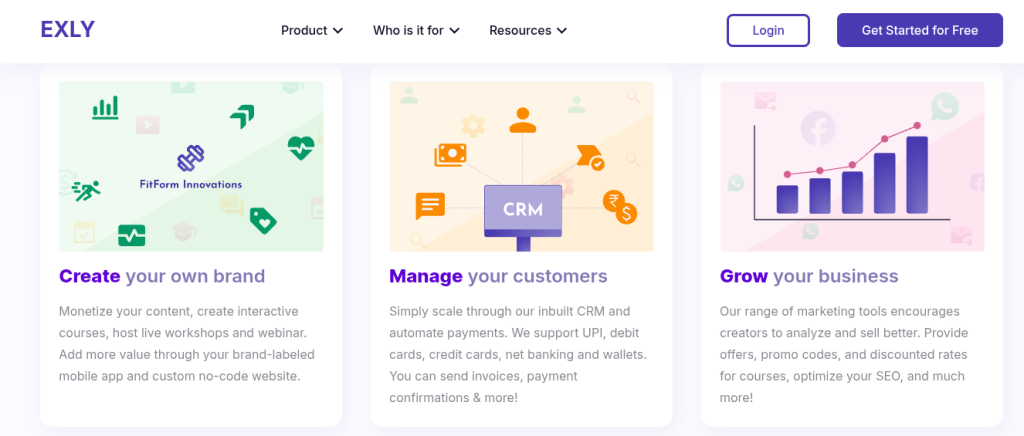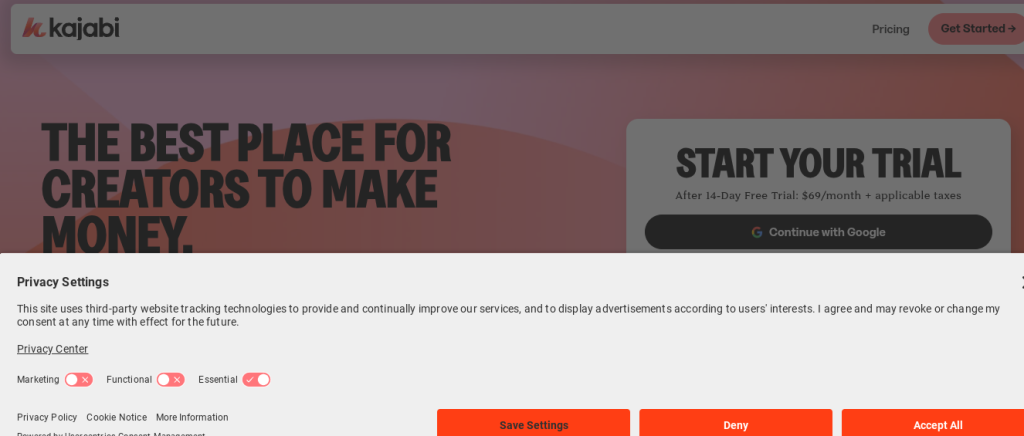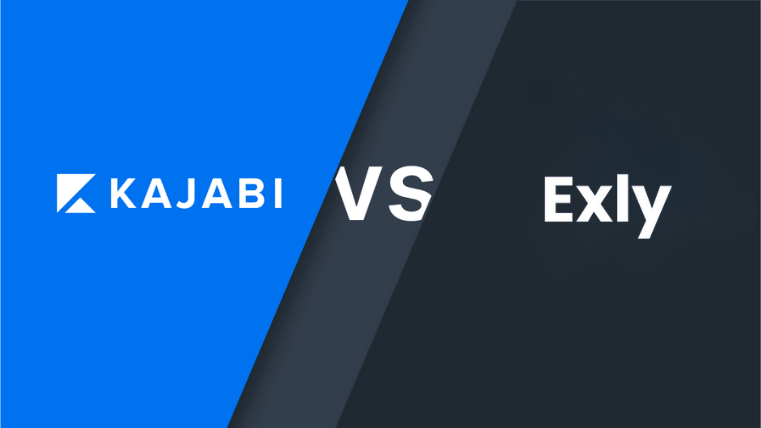In today’s digital age, creators and entrepreneurs seek strong platforms to launch, manage, and grow their online businesses. Exly and Kajabi are two prominent solutions catering to this demand.
The global creator economy is valued at over $191 billion. To be a part of this success selecting the right platform is crucial to maximizing profit margins and effectively reaching target audiences. In this comparison, we will explore the features, pricing, usability, and overall value of Exly and Kajabi to help you make an informed decision for your online business.
An Overview of the Platforms
Platforms like Exly and Kajabi provide comprehensive solutions to help users monetize their skills, manage operations, and connect with audiences effectively. While Exly focuses on simplicity and affordability for professionals and small businesses, Kajabi caters to a broader range of entrepreneurs with advanced tools for creating, marketing, and selling digital products.

Exly is an all-in-one platform that helps professionals, artists, and creators launch, manage, and grow online businesses. It offers course creation, appointment scheduling, payment processing, and customer relationship management (CRM) features. Exly enables users to create interactive courses, host live workshops, and monetize their content effectively.

Kajabi is a comprehensive platform that empowers entrepreneurs to create, market, and sell digital products, including online courses, coaching programs, memberships, and podcasts. It provides tools for website building, email marketing, sales funnels, and community engagement, allowing users to manage their entire online business from a single dashboard.
This comparison provides a detailed analysis of Exly and Kajabi, focusing on their features, pricing structures, ease of use, customization options, target audiences, and overall performance. By exploring these aspects, potential users can decide which platform best aligns with their business objectives and operational needs.
Let’s dive into how these two platforms stack up regarding their core features.
Comparing Exly and Kajabi Features

In this section, we’ll compare the key features of Exly and Kajabi to help you determine which platform aligns best with your business needs.
| FEATURES | EXLY | KAJABI |
| Pricing | Does not restrict features on the basis of price, and start for free | Has 3 Paid Plans and restricts features according to the price |
| OFFERINGS | ||
| Class/Course Scheduling | ✔️ | ✔️ |
| 1-1 Appointments | ✔️ | ✔️ |
| Merchandise | ✔️ | ❌ |
| Growth MARKETING | ||
| Limited Time Offers | ✔️ | ✔️ |
| Discount Codes | ✔️ | ✔️ |
| Brand/Affiliate Partnerships | ✔️ | ✔️ |
| Marketing Integration Tools | ✔️ | ✔️ |
| COMMUNICATION | ||
| Automated Drip Campaigns | ✔️ | ❌ |
| Messaging via Whatsapp | ✔️ | ✔️ |
| Email Campaign | ✔️ | ✔️ |
| PAYMENTS | ||
| Instant KYC | ✔️ | ❌ |
| International Payments | ✔️ | ✔️ |
| ANALYTICS | ||
| Insightful Dashboard | ✔️ | ✔️ |
| WEBSITE | ||
| Multiple Templates | ✔️ | ✔️ |
| Ease of use | ✔️ | ✔️ |
Exly Features
- Course Creation and Management: Exly enables users to create interactive courses, host live workshops, and offer pre-recorded sessions. It supports various formats, including videos and downloadable resources.
- Appointment Scheduling: The platform offers a built-in scheduling tool, allowing clients to book appointments seamlessly. This feature is beneficial for coaches and consultants managing one-on-one sessions.
- Payment Processing: Exly supports multiple payment options, including UPI, debit cards, credit cards, net banking, and wallets, facilitating smooth transactions for both domestic and international clients.
- Customer Relationship Management (CRM): With an inbuilt CRM, Exly helps users manage customer interactions, track bookings, and automate communications, enhancing client relationships.
- Marketing Tools: Exly provides features like discount codes, promotional offers, and SEO optimization to help users grow their business and reach a wider audience.
Kajabi Features
- Product Creation: Kajabi allows users to create various digital products, including online courses, coaching programs, memberships, podcasts, and newsletters, catering to diverse content delivery preferences.
- Website Building: The platform offers a no-code web builder with customizable templates, enabling users to set up fully integrated websites that reflect their brand identity.
- Marketing Automation: Kajabi includes tools for email marketing, sales funnels, and automations, helping users streamline their marketing efforts and nurture leads effectively.
- Community Building: Users can create and manage communities, fostering engagement and interaction among members through discussions, events, and content sharing.
- Analytics and Reporting: Kajabi provides built-in analytics to track member growth, retention, post engagement, and event attendance, offering insights to inform business decisions.
Also Read: Exly- Best Teachable Alternative To Sell Your Courses
Let’s discuss how these platforms charge for their services and which stands out as a complete ‘value-of-money’ package.
Pricing Structure: Exly vs. Kajabi
Understanding the pricing structures of Exly and Kajabi is essential for selecting the platform that best fits your business needs and budget. Here’s a breakdown of their pricing plans and the value they offer:
Exly Pricing Plans
Exly offers a flexible pricing model designed to accommodate various business sizes and needs:
- Commission-Based Model: Exly charges a commission based on your chosen pricing plan. This approach allows creators to start with minimal upfront costs, paying a percentage only when they earn revenue.
- Premium Features: Exly offers plans with upfront payments and reduced commission rates to access advanced features such as WhatsApp Broadcasts, 24/7 support, and brand partnerships. This structure allows businesses to select services that align with their growth strategies.
- Custom Pricing: Exly provides tailored pricing options for large businesses and studios, ensuring that enterprises with specific requirements receive appropriate solutions. However, the platform offers a basic plan starts at just $96/Year.
Kajabi Pricing Plans
Kajabi presents a tiered subscription model with different features at each level:
- Kickstarter Plan: Priced at $69 per month (or $55 per month when billed annually), this plan is ideal for newcomers to online course creation. It includes essential tools for website building, course creation, and membership/product sales.
- Basic Plan: At $149 per month (or $119 per month billed annually), the Basic plan offers three products, three pipelines, unlimited landing pages, unlimited marketing emails, up to 10,000 contacts, and 1,000 active members. This plan suits those starting to build their online presence.
- Growth Plan: Costing $199 per month (or $159 per month billed annually), the Growth plan includes 15 products, 15 pipelines, up to 25,000 contacts, and 10,000 active members. It also offers advanced automation, the ability to remove Kajabi branding, and an affiliate program catering to expanding businesses.
- Pro Plan: At $399 per month (or $319 per month billed annually), the Pro plan provides 100 products, 100 pipelines, up to 100,000 contacts, and 20,000 active members. It includes three websites, 25 admin users, and advanced customization options for established enterprises seeking comprehensive solutions.
Value for Money
When evaluating value for money, consider the following:
- Exly: With its commission-based model and minimal upfront costs, Exly is advantageous for creators and small businesses looking to minimize initial expenses. Accessing premium features through upfront payments with reduced commissions adds flexibility.
- Kajabi: While Kajabi requires higher upfront monthly payments, it offers a comprehensive suite of tools for businesses ready to invest in a robust platform. The tiered plans allow scalability as your business grows, providing more features at each level.
Also Read: How To Use Webinars To Upsell Your High-Ticket Courses?
Ultimately, the choice between Exly and Kajabi depends on your business model, budget constraints, and the specific features that align with your strategic goals.
Usability, Customization, and Performance: Finding the Perfect Fit
Let’s move to the next section to understand these two platforms better and determine which perfectly fits your business’s unique needs.
1. Ease of Use
User Interface and Experience
- Exly: Exly’s interface is clean and user-friendly, designed for creators who want simplicity. It’s intuitive and doesn’t require technical expertise, making it perfect for beginners. Navigating through its features feels effortless, even for first-time users.
- Kajabi: Kajabi has a sleek and professional interface with advanced customization options. While it’s visually appealing, the variety of tools can feel overwhelming for someone new to online platforms. It’s best suited for those familiar with digital tools.
Setup and Onboarding Process
- Exly: Setting up with Exly is a breeze. You can create and launch a professional website in minutes without writing a single line of code. Its guided setup ensures that you start using the platform quickly and confidently.
- Kajabi: Kajabi offers detailed customization during the setup process, which can be time-consuming. While it provides tutorials and resources, the onboarding process may require more time for those new to such platforms.
Customer Support and Resources
- Exly: Exly stands out with its quick and accessible customer support. Features like WhatsApp assistance and one-on-one help ensure you’re never stuck for long. Their personalized approach makes support feel like a conversation.
- Kajabi: Kajabi offers 24/7 support but only for higher-tier plans. Lower-tier users still have access to a knowledge base and community forums, which are helpful but not as immediate.
2. Customization Options
Flexibility in Design
- Exly: Exly offers pre-designed templates that you can easily customize to reflect your brand. It’s ideal for those who want a professional look without spending time or money on complex designs.
- Kajabi: Kajabi provides deeper customization options, allowing users to fine-tune every detail. However, this flexibility has a steeper learning curve and might require more effort.
Integration with Third-Party Tools
- Exly: Integrations on Exly focus on ease and functionality. It seamlessly connects with payment gateways, WhatsApp, and email tools, ensuring smooth workflows for small businesses.
- Kajabi: Kajabi integrates with various tools, including Zapier, Mailchimp, and analytics platforms. This makes it ideal for larger businesses needing diverse functionality.
Personalization Capabilities
- Exly: Personalization on Exly is straightforward. You can automate workflows, customize client communications, and tailor marketing campaigns to specific audiences.
- Kajabi: Kajabi offers advanced personalization features, enabling you to create detailed user journeys. However, setting these up may require more time and technical skills.
3. Target Audience and Usability
Best Suited Industries
Exly caters to individual creators, educators, and small businesses. Thanks to its simplicity and affordability, it’s especially useful for those offering live sessions, workshops, or personalized coaching.
On the other hand, Kajabi serves larger businesses and experienced entrepreneurs. It’s perfect for creating and selling online courses, memberships, and coaching programs at scale, offering tools that support more complex business models.
User Accessibility and Target Demographics
- Exly: With its intuitive design and commission-based pricing, Exly appeals to budget-conscious users and small-scale operators who want a hassle-free platform.
- Kajabi: Kajabi targets professionals who need robust features and have the resources to invest in premium plans. Those with a clear growth strategy best utilize its tools.
4. Performance and Reliability
Platform Stability and Uptime
Both Exly and Kajabi ensure stable platforms with excellent uptime. This means your website or courses remain available to users without interruptions, giving a seamless experience.
Scalability and Growth Potential
- Exly: Exly scales effortlessly as your audience and offerings grow. It’s a great option for creators starting small but aiming for steady expansion.
- Kajabi: Kajabi supports scalability for larger enterprises with tools designed for managing multiple products and larger audiences, albeit at a higher cost.
Data Security and Privacy
- Exly: Exly prioritizes secure transactions and encrypted data storage to protect sensitive user information, making it reliable for both domestic and international transactions.
- Kajabi: Kajabi follows global security standards to ensure the safety of user data. Its comprehensive compliance measures make it a trustworthy option for larger-scale operations.
Final Comparison and Recommendation
Both Exly and Kajabi are wonderful platforms, each with its strengths. Kajabi shines with its advanced customization options, strong community-building tools, and scalability for larger enterprises. It’s a great choice for experienced entrepreneurs looking to manage complex digital products and memberships.
Conversely, Exly is simple, affordable, and provides an easy setup. This makes it perfect for small businesses, educators, and creators who want to get started quickly without technical barriers.
While Kajabi offers impressive features, its high upfront costs and tier-based limitations can be challenging for small-scale users. Exly overcomes these hurdles with its commission-based pricing model and inclusive feature set, ensuring creators only pay after earning. Additionally, Exly’s integration with tools like WhatsApp and its instantly live websites provide a level of ease and flexibility that many find essential.
Ready to take your business to the next level? Get started for free with Exly today and experience the simplicity and power of growing your brand online!Also Read: Exly vs Knorish: Who Offers Better Features For Creators?





